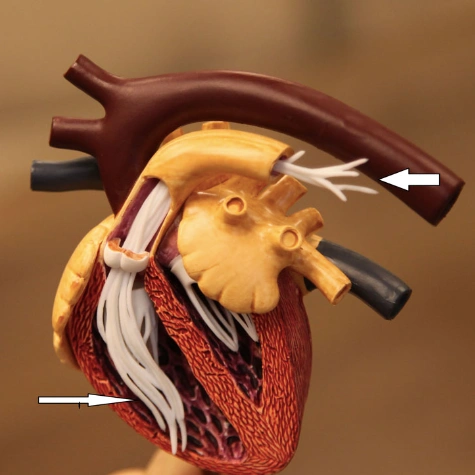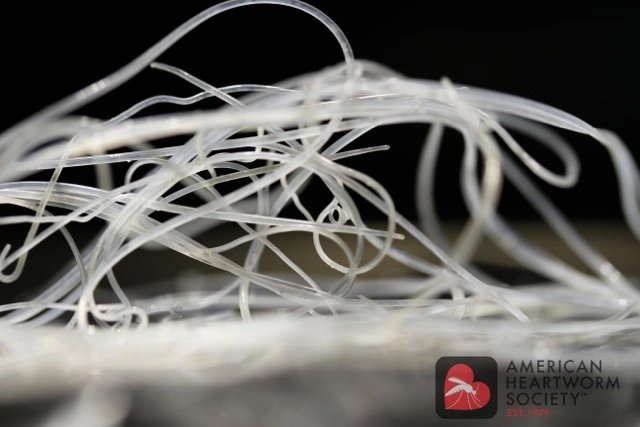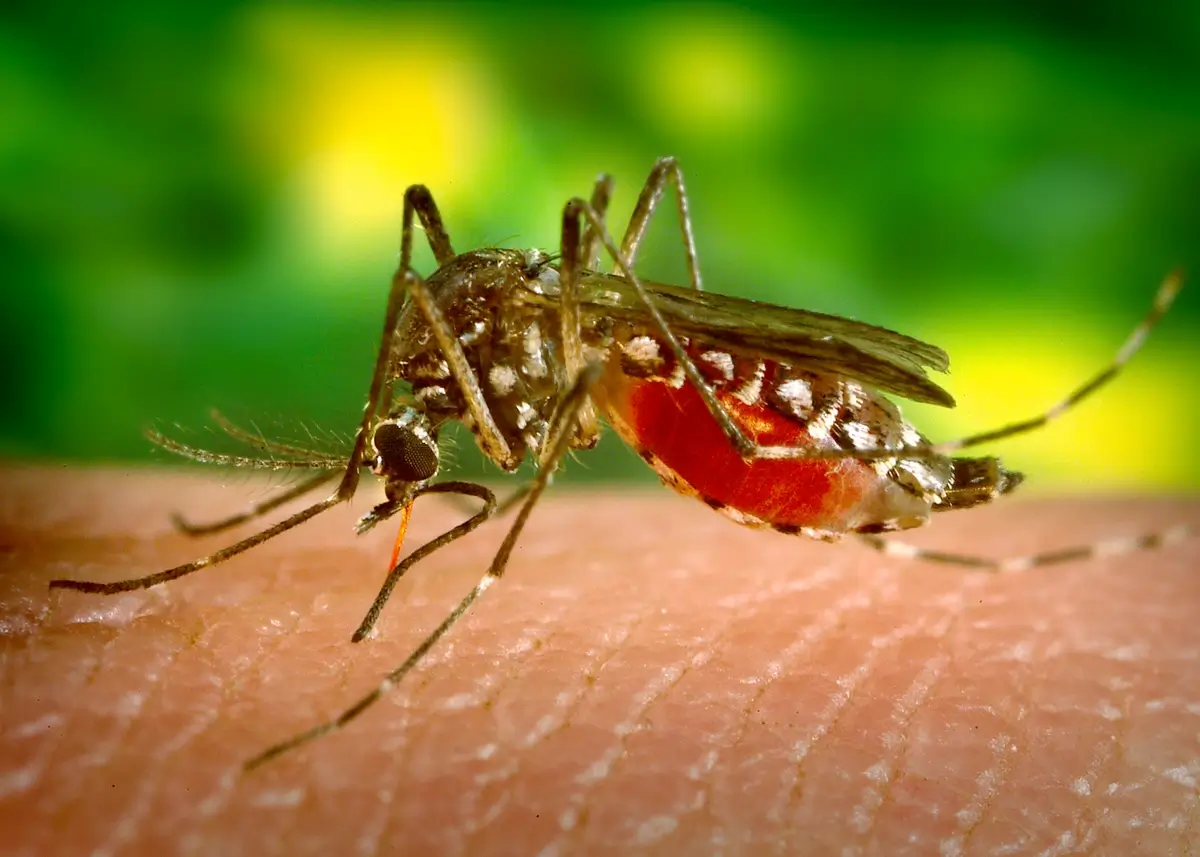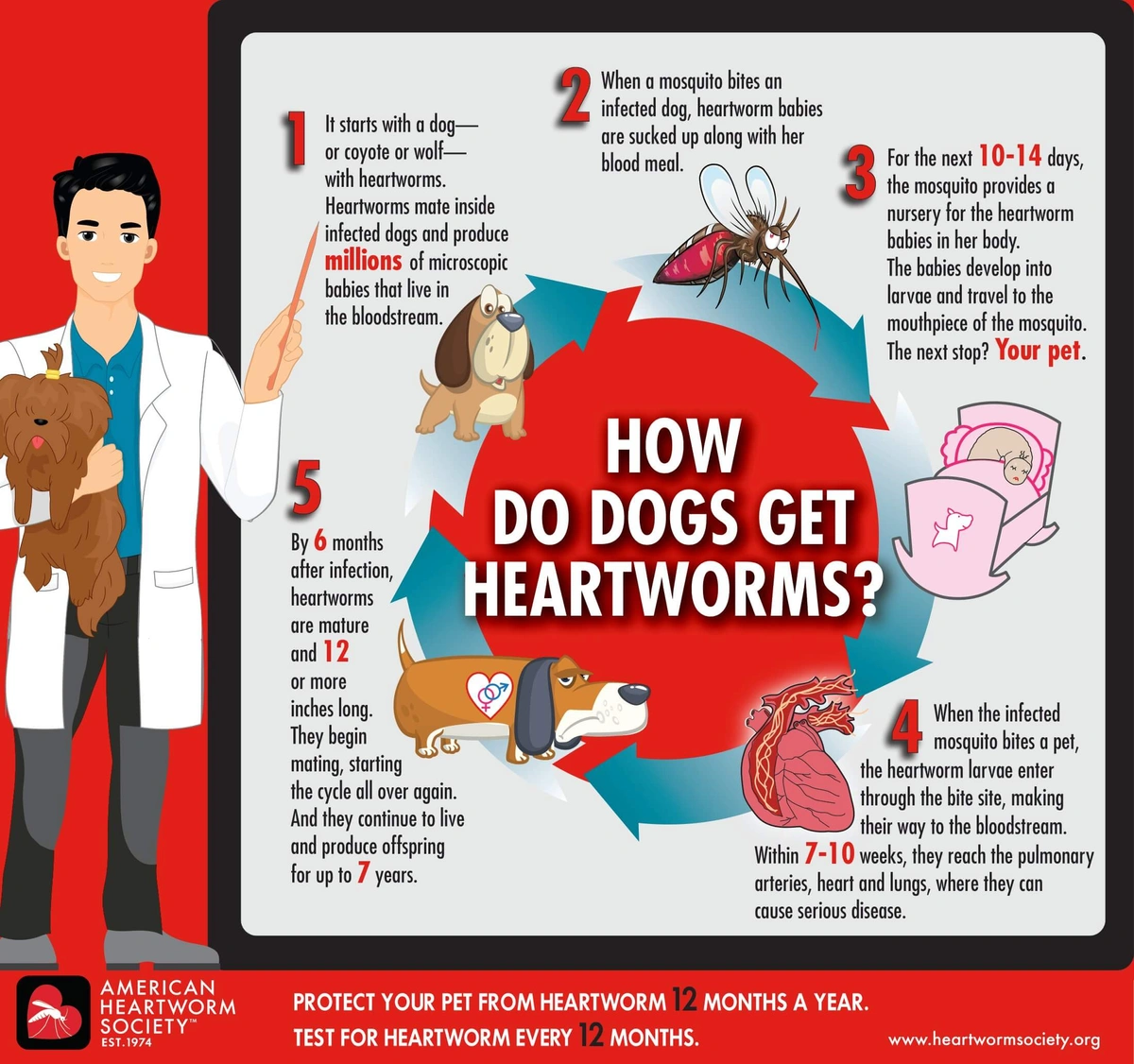April is Heartworm Prevention Month, so what better way to celebrate than making sure your puppy is protected? Heartworm disease is a serious health concern that can impact canines of all breeds and sizes all over the world. It is one of the most preventable common illnesses in puppies but can have detrimental and even fatal effects if left untreated.
What Exactly is Heartworm?
Heartworm disease is a parasitic disease that affects puppies and other animals, including cats, coyotes, ferrets, and more. Recognizing the early signs of heart disease and seeking treatment promptly is crucial to managing the condition and helping your furry friend live a happy, healthy life.
You may be wondering if there are actual worms in a dog’s heart, or is that just metaphorical?
No, you were right the first time – heartworm are actual worms! Gross, right? Heartworm disease in dogs is caused by the heartworm parasite, known as Dirofilaria immitis, which lives in the heart, lungs, and associated blood vessels of infected dogs, and is transmitted by mosquitoes. And unless they are treated, they will keep happily reproducing and keep their life cycles going. In fact, a heartworm infestation can live in a puppy for 5-7 years!
Image courtesy of Oklahoma State University
Ew, so what does heartworm look like?
If you are squeamish, you may be tempted to skip this part, but it’s vital that you know this to prevent heartworm in your puppy!
According to the US Food & Drug Administration, adult heartworms look like strands of cooked spaghetti, with male heartworm growing 4-6 inches and females getting 10-12 inches long.
Image of heartworm used with permission from American Heartworm Society
How many worms are we talking about?
So when a dog gets heartworm, there’s just one worm, right? Right?
We regret to inform you that heartworm gets even grosser when we tell you that most cases of heartworm are technically “heartworms” – that’s right, heartworm is actually plural in a large majority of heartworm infections! The amount of worms found in a heartworm-positive puppy is called the worm burden. Depending on what stage of heartworm disease a dog is in, up to 300 worms can be found with the average case being 15 worms for the worm burden count.
How Does a Puppy Get Heartworm?
Mosquitoes aren't only pesky bloodsuckers that cause itchy bumps – they could also be putting your furry friend's heart at risk! Puppies are particularly susceptible to heartworm disease because they have not yet developed immunity to the parasite and love to romp around outside where mosquitoes live.
Puppies that are not properly protected with heartworm prevention medications are at risk of developing heartworm disease if they are bitten by an infected mosquito.
Introducing Dirofilaria immitis
When a mosquito bites an infected animal, it ingests tiny larvae (Dirofilaria immitis) that circulate in the bloodstream. These develop into infective larvae within the mosquito and are then transmitted to other animals when the mosquito bites again.
Mosquitoes are the primary hosts and carriers of Dirofilaria immitis. When a mosquito bites a dog that has microfilariae in its bloodstream, it ingests these microfilariae and becomes infected. Over time, the microfilariae develop into infective larvae within the mosquito, which can then be transmitted to other dogs through subsequent mosquito bites. Once the infective larvae enter a dog's bloodstream, they migrate to the heart and lungs, where they grow and mature into adult worms.
The Heartworm Lifecycle. Used with permission from the American Heartworm Society
What are the Signs of a Heartworm Infection?
It’s important to understand the signs of a heartworm infection so you can alert your veterinarian right away if you see any changes in your puppy’s behavior. Heartworm disease can have a range of effects on a dog's body depending on the severity of the infection and include problems in not only the heart but also in the lungs, kidneys, liver, and other areas.
In the early stages of the disease, dogs may show few or no symptoms at all. However, as the infection progresses, dogs may begin to exhibit a range of symptoms, including coughing, difficulty breathing, fatigue, loss of appetite, and weight loss. In severe cases, heartworm disease can cause heart failure, lung disease, and even death.
4 stages of heartworm
Heartworm disease ranges in severity with 4 recognized stages. Symptoms of each stage can include:
- Stage 1: Minimal signs can include coughing and fatigue, but there may not be any outward signs
- Stage 2: Respiratory problems, increased fatigue
- Stage 3: Significant weakness and fluid buildup in the lungs
- Stage 4: Life-complicating symptoms such as heart failure
Should I Worry About Heartworm Only in the Summer?
Even though summertime does see an increase in mosquito breeding, heartworm does not care about the season. A puppy can contract heartworm 365 days a year, even in areas where you wouldn’t expect it.
Speaking of geographical areas, it is true that heartworm is the most prevalent in certain Southern states in the US due to the perfect climate for mosquitoes, but they do not care about state borders, either! Heartworm cases have been reported in all 50 states and even in animals who are indoor pets.
Is Heartworm Disease in Puppies Contagious?
If you are around heartworm-positive puppies or dogs, you cannot catch them as a human. Likewise, infected puppies cannot transmit heartworms to other puppies, dogs, or pets. The only way heartworm is transmitted from puppy to puppy is through a mosquito bite of a mosquito carrying Dirofilaria immitis.
What are the Treatment Methods for Heartworm Disease in Dogs?
Treating heartworm disease can be costly, time-consuming, risky, and even painful for your puppy.
Heartworm treatment involves a series of injections of a drug called melarsomine dihydrochloride, which is designed to kill the adult and immature worms in the heart and lungs. Before starting the treatment, your puppy will need to undergo a series of tests to assess the severity of the infection and to determine if it is safe to proceed with treatment.
In some cases, dogs may also require additional treatment to manage the symptoms of heartworm disease, such as antibiotics to prevent secondary infections and medications to alleviate coughing and breathing difficulties. And for extremely rare cases, heart surgery may be the only option.
How Can I Prevent Heartworm?
We are so glad you asked because preventing heartworm is way easier than treating it! In fact, heartworm disease is almost always preventable, so that will give you peace of mind knowing you can actively fight heartworm before they wiggle their way into your puppy’s heart.
Heartworm prevention medication
The most effective way to prevent heartworm disease is to use a monthly heartworm prevention medication for dogs. Heartworm prevention medication will kill off any larval stages of Dirofilaria immitis that may be in the blood system. These medications come in various forms, including pills, topical solutions, and injections. Several are combined with flea and tick prevention, another set of parasites that can wreak havoc on your growing puppy’s health.
When should my puppy go on heartworm prevention?
The typical age puppies should begin receiving preventative medication is as early as the medication instructions allow (sometimes around 6-8 weeks) or no later than 8 weeks of age. This can help to kill any heartworm larvae that may be present in their bloodstream before they have a chance to mature into adult worms.
Be gone, ye pestilent mosquitoes!
We know you want to cool off your puppy in the dog days of summer by splashing in baby pools and playing in the sprinkler, but you can also take some precautions outside where mosquitoes thrive.
Standing water is the perfect breeding ground for mosquitoes. Do your best to get rid of standing water in baby pools, bird baths, puddles, garden pots, low-lying areas with drainage problems, and anywhere else you see water collecting and sitting to prevent a mosquito mating frenzy.
Before you allow your puppy outside, make sure you have treated your yard with puppy-safe, non-toxic mosquito repellent & plants. Naturally deterrent plants that mosquitoes hate and are also safe for dogs are rosemary, basil, catnip, and lemon balm.
Mosquitoes hate citrus
Here’s a fun scene: you’re outside chasing your puppy with half of a lemon cupped in your hand, trying to squeeze it on her coat, and your neighbor walks by. “Oh, I’m just trying to prevent heartworm!” you call out.
It’s true – mosquitoes can't stand citrus, and one pet-friendly way to deter mosquitoes is to rub some freshly cut or squeezed citrus on your puppy’s body.
A note about citronella & essential oils
Many of us will automatically reach for citronella-based products such as spray, candles, or the plant itself. Unfortunately, the citronella plant can be toxic to dogs, so keep these products and plant away from puppies and use a pet-safe alternative.
Many people use certain essential oils to prevent mosquito bites. Not so fast though – several essential oils that are safe for humans are not safe for puppies. Always ask your veterinarian which sprays on the market, such as those with geranium oil or lemon eucalyptus, are safe for your puppy.
Stay inside
If you know mosquitoes are particularly bad in your area or during a certain season, you may want to consider limiting your puppy’s time outside if possible until you are comfortable with your lawn or yard mosquito treatment plan.
Should Have My Puppy Tested for Heartworm?
Yes! Experts recommend a puppy treated for heartworms be tested every 12 months. Regular heartworm testing in puppies can help to detect the presence of heartworms early when treatment is most effective, even if you give regular heartworm prevention medicine.
It’s easy to accidentally forget to give your puppy medication on a regular basis or run out of doses and forget to reorder. In addition, you may have the wrong dosage if your puppy is growing rapidly and you still have medication from the last weight range your puppy was in when you bought it. These are all honest mistakes, but they could have devastating consequences. For these reasons, ask your veterinarian how often your puppy should receive a heartworm test.
A heartworm test is a simple blood test your vet will take and send to a lab. Technicians then inspect the blood under a microscope to see if they detect the presence of parasites. If a vet suspects heartworm, he or she may also test liver & kidney functions, take a chest X-ray, or do an ultrasound on your puppy’s heart.
Pawrade Puppies Have Healthy Hearts
One of the wonderful things about buying a puppy for sale with Pawrade is our comprehensive health guarantee that comes with every puppy. Our trusted breeders pledge to provide puppies with all their necessary age-appropriate puppy vaccinations. Browse through our puppies for sale to find your next 4-legged best friend!







